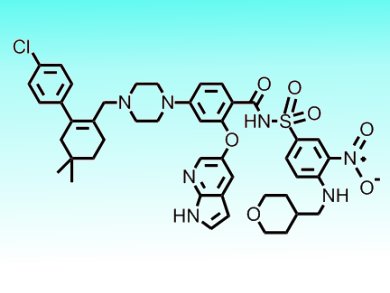Navitoclax is a high affinity inhibitor of BCL-2, a protein which keeps malignant blood cells alive. Although this drug has a powerful anti-tumoral activity, its clinical efficacy is limited as it induces a dose-dependent reduction in the numbers of platelets, cells forming blood clots. This side effect is caused by the concomitant inhibition of BCL-XL, a molecule sharing strong structural similarities with BCL-2.
By examining the X-ray crystal structure of Navitoclax-BCL-2 complexes, Andrew Souers, AbbVie Inc., Illinois, USA, and colleagues re-engineered the compound and imparted it a higher selectivity for BCL-2. The new drug, 4-(4-{[2-(4-chlorophenyl)-4,4-dimethylcyclohex-1-en-1-yl]methyl}piperazin-1-yl)-N-({3-nitro-4-[(tetrahydro-2H-pyran-4-ylmethyl)amino]phenyl}sulfonyl)-2-(1H-pyrrolo[2,3-b]pyridin-5-yloxy)benzamide (pictured), retained strong anti-cancer effects and did not decrease platelets’ numbers.
- ABT-199, a potent and selective BCL-2 inhibitor, achieves antitumor activity while sparing platelets,
A. J. Souers, J. D. Leverson, E. R. Boghaert, S. L. Ackler, N. D. Catron, J. Chen, B. D. Dayton, H. Ding, S. H Enschede, W. J. Fairbrother, D. C. S Huang, S. G. Hymowitz, S. Jin, S. L. Khaw, P. J Kovar, L. T. Lam, J. Lee, H. L. Maecker, K. C Marsh, K. D. Mason, M. J. Mitten, P. M. Nimmer, A. Oleksijew, C. H. Park, C. Park, D. C Phillips, A. W Roberts, D. Sampath, J. F. Seymour, M. L. Smith, G. M. Sullivan, S. K. Tahir, C. Tse, M. D Wendt, Y. Xiao, J. C Xue, H. Zhang, R. A. Humerickhouse, S. H. Rosenberg, S. W. Elmore,
Nature Med. 2013.
DOI: 10.1038/nm.3048




